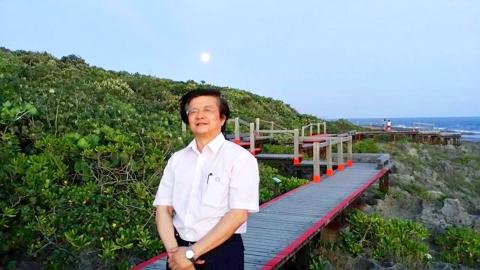China’s Taiwan Affairs Office yesterday confirmed that Tsai Chin-shu (蔡金樹), chairman of the Southern Taiwan Union of Cross-strait Relations Associations, was “investigated” by Chinese authorities in July last year for allegedly engaging in activity that “endangers national security.”
Tsai’s family members were notified by authorities, office spokesman Ma Xiaoguang (馬曉光) said at a news conference in Beijing.
Media reports that contact with him had been lost were fabricated, Ma said, adding that the authorities handled the case with strict adherence to the law and guaranteed Tsai’s legal rights.

Screen grab from Facebook
The confirmation came after Shih Chien University chair professor Chiang Min-chin (江岷欽) on Sept. 12 said on a political talk show that Tsai had been taken into custody for “national security reasons” about half a year ago.
Tsai is an avid supporter of the pan-blue camp, but was still “locked up,” Chiang said.
The Straits Exchange Foundation on Sept. 13 said that Tsai’s family members in August last year told the foundation that they had lost contact with Tsai after he checked out of a hotel room in Xiamen, China, on July 21 last year, a day after he had traveled to Quanzhou to attend the Cross-Strait Food Fair.
The foundation immediately sent a letter to China’s Association for Relations Across the Taiwan Straits requesting help in finding Tsai, but it said that it has yet to receive a “concrete response.”
Other unnamed sources said that Tsai was allegedly taken away by Chinese national security personnel on July 22 last year while making a connecting flight in Xiamen.
The most important task right now is to ensure Tsai’s safety, Executive Yuan spokeswoman Kolas Yotaka said yesterday.
Tsai’s safety is what his family members care most about, she said.
Tsai has “been missing” for some time, and the authorities have made the case a priority, she said.
“The Chinese government is mostly just politics and no rule of law,” she said.
Beijing’s claim that Tsai broke the law is “unconvincing” to Tsai’s family and the public, she said.
Officials have been instructed to gain an understanding of the situation as quickly as possible, she said, adding that the government’s determination to keep the public safe has not changed.
Tsai, 60, holds a master’s degree from National Sun Yat-sen University’s Institute of Political Science and a doctoral degree in regional economics from Xiamen University’s Graduate Institute for Taiwan Studies.
He is also the chairman of the Kaohsiung City Cross-Strait Relations Studies Association.

The Ministry of Foreign Affairs (MOFA) yesterday said it is closely monitoring developments in Venezuela, and would continue to cooperate with democratic allies and work together for regional and global security, stability, and prosperity. The remarks came after the US on Saturday launched a series of airstrikes in Venezuela and kidnapped Venezuelan President Nicolas Maduro, who was later flown to New York along with his wife. The pair face US charges related to drug trafficking and alleged cooperation with gangs designated as terrorist organizations. Maduro has denied the allegations. The ministry said that it is closely monitoring the political and economic situation

UNRELENTING: China attempted cyberattacks on Taiwan’s critical infrastructure 2.63 million times per day last year, up from 1.23 million in 2023, the NSB said China’s cyberarmy has long engaged in cyberattacks against Taiwan’s critical infrastructure, employing diverse and evolving tactics, the National Security Bureau (NSB) said yesterday, adding that cyberattacks on critical energy infrastructure last year increased 10-fold compared with the previous year. The NSB yesterday released a report titled Analysis on China’s Cyber Threats to Taiwan’s Critical Infrastructure in 2025, outlining the number of cyberattacks, major tactics and hacker groups. Taiwan’s national intelligence community identified a large number of cybersecurity incidents last year, the bureau said in a statement. China’s cyberarmy last year launched an average of 2.63 million intrusion attempts per day targeting Taiwan’s critical

‘SLICING METHOD’: In the event of a blockade, the China Coast Guard would intercept Taiwanese ships while its navy would seek to deter foreign intervention China’s military drills around Taiwan this week signaled potential strategies to cut the nation off from energy supplies and foreign military assistance, a US think tank report said. The Chinese People’s Liberation Army (PLA) conducted what it called “Justice Mission 2025” exercises from Monday to Tuesday in five maritime zones and airspace around Taiwan, calling them a warning to “Taiwanese independence” forces. In a report released on Wednesday, the Institute for the Study of War said the exercises effectively simulated blocking shipping routes to major port cities, including Kaohsiung, Keelung and Hualien. Taiwan would be highly vulnerable under such a blockade, because it

UNDER WAY: The contract for advanced sensor systems would be fulfilled in Florida, and is expected to be completed by June 2031, the Pentagon said Lockheed Martin has been given a contract involving foreign military sales to Taiwan to meet what Washington calls “an urgent operational need” of Taiwan’s air force, the Pentagon said on Wednesday. The contract has a ceiling value of US$328.5 million, with US$157.3 million in foreign military sales funds obligated at the time of award, the Pentagon said in a statement. “This contract provides for the procurement and delivery of 55 Infrared Search and Track Legion Enhanced Sensor Pods, processors, pod containers and processor containers required to meet the urgent operational need of the Taiwan air force,” it said. The contract’s work would be